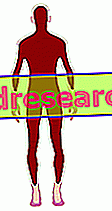Anorexia nervosa is a disorder of eating behavior characterized by the refusal of food, which arises from the morbid fear of gaining weight; the stubborn desire to stay under a normal weight, however perceived as excessive by the anorexic, leads to the development of an obsessive repulsion towards the food that spreads until triggering the physical symptoms of overt anorexia: body weight under the limits of normality ( less than 85% of the ideal weight, BMI less than 1.75 kg / m2), frankly pathological thinness, low body temperature, bradycardia, nail and hair fragility, osteopenia, alopecia, reduction in breast volume, hypotension, dry skin, debilitated / cachectic appearance, menstrual delays and amenorrhea (delay of at least three consecutive menstrual cycles).

Some of the symptoms of anorexia so far listed exclusively concern the female sex, in which the frequency of the disease is 20 to 25 times higher than the male population. In anorexic man it is possible to appreciate an important drop in libido and ejaculatory activity.
In the presence of anorexia, blood tests can detect endocrine changes with thyroid hormone, leptin and gonadotropin values close to or below the normal limits. Anemia, leukopenia with lymphocytopenia, hypokalemia, hypocalcemia, hypomagnesemia and hypophosphoremia, metabolic alkalosis and hypoglycemia can be recorded. The basal metabolic rate appears decidedly lower than the norm.
The onset of anorexia is rather nuanced on the symptomatological level and difficult to recognize even by family members. A low body weight, even if not yet pathological, associated with the yellow-orange color of the palms and soles of the feet, can be one of the few physical symptoms associated with anorexia nervosa in the early stages. This symptom could in fact derive from the habit of eating almost exclusively vegetables, many of which are rich in carotenoids, which accumulate in the skin. The condition should not be confused with jaundice, in which thinness is caused by hepatic disorders and yellowish coloring also extends to ocular sclerae.
In the onset phases of anorexia nervosa are above all some symptoms of a psychological nature, translated into actions and peculiar moods, to make the disease suspect:
- morbid fear of gaining weight;
- obsessive rejection of food or certain types of food, such as those that contain not insignificant amounts of fats or sugars;
- altered body perception: fat tends to be seen although the balance needle indicates a normal body weight, lower than normal or decidedly underweight; anxiety in seeing one's body;
- excessive exercise in a desperate attempt to burn more calories;
- hyperactivity;
- tendency to hide or not admit to having a problem with food: we lie about the quantity of food consumed and trivialize or hide the symptoms and physical disorders deriving from anorexia;
- feeling uneasy when eating in public or in the company of other people;
- abuse of laxatives and diuretics, thyroid extracts or other weight loss preparations;
- unconscious practices to consume more calories, for example to perform showers or baths with cold water, unbridled physical exercises at times or in unusual places, practice of motor activity despite the precarious physical conditions, consumption of water in high quantities to stimulate the sense of satiety;
- attempt to look thinner by choosing black clothes and cutting hair;
- ritualistic compulsive behavior with regard to food (cutting the dishes into very small pieces and turning them on the plate before eating them, cooking elaborate dishes for the family without tasting what is prepared, collecting and cataloging the recipes);
- depressive symptoms and, in some subjects, suicidal thoughts.



